|
I was recently in a discussion where some women who had not breastfed their first child said they wanted to try to breastfeed their second child. This is a topic close to my heart as I didn't succeed in breastfeeding my eldest child, but am enjoying a great breastfeeding relationship with my second child who turned two last week. I want to pass on some of the things I learned in my journey).
Here is my TOP TEN to-do list for parents who want to succeed in breastfeeding their next baby:
Anyone else got any tips / ideas / anecdotes to pass on? I would love to hear them! (As you may have guessed, I am passionate about helping women breastfeed. I completely understand that some women can't breastfeed exclusively: but for the small minority of women who don't produce enough/any milk, I want them to know that a breastfeeding relationship is still possible - breasts are way more than just milk! And I want for EVERY woman to have the option of choosing donor milk should they wish. I have written in more detail about my breastfeeding experience here.)
0 Comments
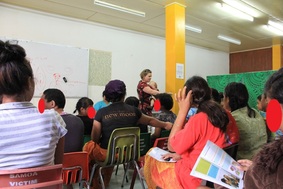 I was privileged to spend some time with some gorgeous girls in Samoa last year. As my blog posting has been sporadic-at-best as of late, this has sat in my 'drafts' way too long! Background In 2013 I was planning a family holiday to Samoa. As someone passionate about social justice, I like to ‘give back’ to the communities I live in and visit. I had helped organised an aid package to go to Samoa Victim Support Group previously, and I thought I may be able to offer a workshop to the girls at their residential shelter. Wellington-based charity SpinningTop connected me to their President Lina and we organised for me to provide a workshop for them. What I Did When we arrived in Apia I met with Lina at the SVSG offices and she gave me more background on their organisation. We discussed what I would be teaching the girls and I gave Lina a couple of boxes of supplies I had brought with me – Air NZ had kindly agreed to transport these for free. The boxes contained some donated stationery items, disposable sanitary pads donated by Kotex, as well as re-usable packs from Days For Girls NZ (containing underwear, cloth pads, and a wash cloth). I spent a morning with approximately 30 girls - the girls were fantastic and really engaged, and the staff were very supportive. The girls were gorgeous, so full of smiles and laughter. They are survivors for whom I have the utmost of respect for. Lina had told me some of their stories, and these girls have all been on traumatic and heartbreaking journeys. Most of them are with SVSG because they are survivors of sexual violence, for many of them this is incest. Many of them have been pregnant as a result of this violence. Tragically in many cases these girls have been disowned and blamed for bringing shame on the family. SVSG provides safety, education and a home for these girls. SVSG also manages the legal process to bring justice for these children. The girls had lots of questions and I felt like we could have spent a lot more time together. The level of knowledge and understanding of how their bodies work was very low. Most knew very little about the menstrual cycle, pregnancy and childbirth - despite there being pregnant girls and girls who had already birthed in the group. My (then 10 month old) daughter Nina accompanied me and I found that having her there was a good ‘icebreaker’ with the girls. The girls enjoyed chatting and playing with Nina as they warmed up to me. As it turned out Nina ended up sleeping in my front-pack for most of the morning as I taught - it was more than 30 degrees in the classroom so we were rather sweaty by the end of it! I was a little taken aback when TV cameras arrived just as we were starting. They filmed the introductory part of my session and then in the middle of the session I was called out for an interview. I was a little anxious about this as had had no warning and I wasn't sure what angle they were going to take, but I kept it very neutral and emphasised the importance of all people having a good understanding of their bodies and sexuality. It came across well on the news that night. I left SVSG feeling like what I had done that day with the girls was but a drop in the ocean. I felt like I had empowered the the girls with knowledge of their bodies, but also knew there was so much information we didn't cover. SVSG were hugely grateful for the workshop, but I wanted to do more. These girls really touched my heart. There is a huge need for ongoing body/sexuality education as well as antenatal education for the pregnant girls. SVSG has been on my mind a lot since. Looking Forward Earlier this year SpinningTop approached me to see if I would be interested in offering a more comprehensive programme for the girls at SVSG. With SpinningTop's support, I am returning to provide a one-week programme in August 2014. I am currently fundraising for supplies (food, baby formula, educational supplies) for SVSG and am hugely appreciative of any donations. For more details on this project, please click here. 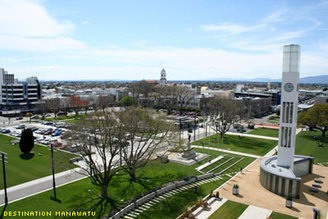 I am sick and tired of victim blaming. I am sick and tired of seeing directives for women on how to "keep safe". I am sick and tired of seeing resources put into "keeping women safe" while the equivalent amount of energy is not directed towards educating their would-be attackers on not attacking. Earlier this week I was dismayed to see my own town was jumping on the bandwagon when I read the headline "City angel' to keep eye on women". It caught my attention because it sounded a bit creepy. Women need to have an eye kept on them? (I guess we do if you subscribe to the patriarchal notion that we probably shouldn't be out and about by ourselves anyway because we will probably use our evil forces to tempt men to attack us. But I digress.) The article states that "Young women out on the town in Palmerston North now have their very own "angel" to look out for them....in the hope of reducing harm and victimisation of young women as a result of excess alcohol consumption." NO! Stop right there. Victimisation is NEVER the RESULT of excess alcohol consumption! The only reason a young woman is victimised is because SOMEONE ELSE assaulted/raped her. End of story. Being generous, I tried to interpret the initial sentence as meaning that the 'Angel' would help protect the women from other people (presumably men) who had consumed too much alcohol. But no, it wasn't anything to do with the men - the 'Angel' "would work with young women in particular to make them aware of the harm intoxication can bring, as well as how to stay safe in the city." I absolutely agree that alcohol can cause harm to oneself. Heck, I have been there. But we need to be clear that alcohol never ever ever causes a woman to be victimised. The council is putting money into making women change their behaviour, but ignoring the fact that the problem is actually the rapists. In doing this they are putting the blame squarely on the females. Furthermore, the big issue with this sort of "crime prevention" is that any behaviour change of potential victims simply displaces the crime. As a friend of mine commented, this approach simply says "Don't get drunk girls, stay sober and make sure another girl is victimised instead." I am just so weary of the same-old same-old "watch out women you need to be more careful" line, when our leaders could equally be saying to men: "Hey, the vast majority of rapists are men - are you sure you are safe enough for us to let you out on the streets?". I think the concept is excellent - someone helping out young people in town. Someone educating young people on the harm alcohol does. But to gender it, to solely focus on females, doesn't solve the bigger problem. The problem is that we have a rape culture that enables men to justify their actions and leaves women scared to walk through the Square at night. The follow-on effect this has is that victims are made to feel they didn't do enough to stop their attacker and the attackers can lean on our rape culture and point out all the things his victim did "wrong". (To learn more about rape culture I highly recommend you visit this site) I would feel far more at ease with this initiative if the same amount of energy was given to having consent conversations and education with the males in town. If this is happening already and I am unaware of it, then FABULOUS and I will eat my words and issue a hearty apology (whilst also pointing out that that story obviously wasn't worth newspaper headlines). Come on Palmerston North City Council, where is the money and resources for consent education for males out on the town? Why must it start with changing the women? Why is it always about us, and our behaviour? 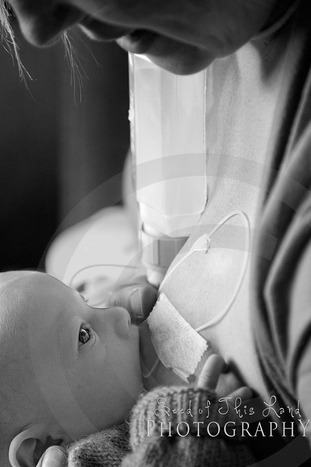 Two weeks old using an SNS. Photo by Robin Atherton. Two weeks old using an SNS. Photo by Robin Atherton. My story is part of the Blog carnival organised by World Milksharing Week, to celebrate World Milksharing Week 2013. Click here to read more stories about milksharing. If you’d like to participate too, please visit this page. When I was pregnant with my first child I learnt about how amazing breastmilk was. It’s pretty much liquid gold. I was determined to breastfeed. To my distress, things didn't go as planned. Due to many factors, my son Sol was given formula within 6 hours of birth, and although I did everything within my knowledge at the time Sol was fully formula-fed from six weeks. Failure to breastfeed long-term traumatised me on many levels. Many people didn't understand this – I was told by many “formula’s fine, he’ll be fine”, which of course it was, and he is. But this attitude undermined and invalidated my grief. Yes, formula’s “fine”, but it is not what babies were born to consume, and science indicates that the detrimental effects are numerous. (For example, it is estimated that the U.S. might save $13 billion in healthcare and other costs annually, and save over 900 babies a year if 90% if babies were exclusively breastfed for six months.) Breast isn't best, it's normal. When I was pregnant with my daughter last year I devoured every book I could find on breastfeeding. I spent a lot of time researching, understanding and finding support in my community so that I knew I had done everything I could to breastfeed my next baby. I learnt about the many things that did and did not happen in Sol’s first few days and weeks that contributed to him not being a breastfed baby. During this time I also learnt about breastmilk sharing. The World Health Organisation and UNICEF support donor human milk as the first alternative where mother's milk is not available. I decided that should I need to supplement my milk, I would do my best to find my baby human milk. Everything about Nina’s birth was wonderful (birth story here). She even did a breast crawl and latched herself on. I was in awe of her, my amazing beautiful baby. But after that first feed, I had a painful blister on my nipple. Luckily I had a fantastic midwife and she diagnosed a tongue-tie immediately. (I was later to find out Sol is also tongue-tied, which goes a long way in explaining why he never suckled and had trouble with a bottle). Thus began a journey that involved much blood (my nipples), travel (Wellington and Hamilton for Nina’s tongue laser surgery), many many sleepless nights as poor Nina tried to drink with severely restricted tongue mobility, and many many tears (hers and mine in equal parts!). By day 10 Nina had not gained enough weight and we were faced with the prospect of formula. In tears, I told my midwife that I wanted to try and find human milk for Nina. I knew the effects of non-human milk on an infant gut, and I wanted to do all I could to avoid that. My wonderful midwife fully supported this decision. I posted a request for breast milk on my local parenting group Facebook page and within 20 minutes I had offers of milk from a number of women. At that point I sat on the couch crying at the sheer generosity and amazingness of people. My husband sat with me and was similarly amazed and overwhelmed at this community of mamas. Within two hours a very special woman arrived with over a litre of breastmilk. That was a really emotional moment for me, and in fact every time we had a delivery of frozen bags of milk I got teary with gratitude. I also reached out to the Eats on Feets Aotearoa community, who were similarly incredibly supportive. A wonderful side-effect of milk sharing are the beautiful connections I made with many women. Throughout the time we were supplementing with donor milk I was worried about “nipple confusion” so I avoided using a bottle and fed Nina the donor milk through a supplementary nursing system. This had the added bonus of extra time at my breast, further stimulating my milk supply. It took 13 weeks, and my milk combined with five superstar milk-mamas until we got the tongue-tie sorted and I was able to exclusively breastfeed Nina. We’re still going strong at 11.5 months and she has still never had any formula. Going beyond the nutritional benefits of breastmilk, I feel just so grateful to have experienced the simplicity and beauty of a breastfeeding dyad. My body responding to Nina and her needs in the most simple and perfect way. Watching her eyes roll back in pure drunken happiness as the milk fills her belly is one of my life’s most beautiful moments. Now that she is older, I love her ways of communicating to me that she needs milk, and the delighted grin on her face afterwards as she toddles away. She looks round the room grinning delightedly at everyone who will look at her, as if to say “that was DELICIOUS!” People have started to ask me when we are going to stop breastfeeding. I tell them to ask Nina. She is still a huge fan, so I don’t think it will be any time soon. The World Health Organisation recommends that children are breastfed for a minimum of two years. I am immensely proud that we have made it this far together and I love the idea of full-term breastfeeding and Nina choosing when she is ready to wean. (Oddly enough I still feel anxious putting that dream out there in to the universe, as it I still can't quite believe we have made it this far!) When I was receiving donor milk for Nina, I imagined one day being able to donate my milk to other babies in need. I am not sure I ever believed that day would come. But it has, and I feel so emotional packaging up my precious packs of frozen gold, ready to nurture another baby. I am thankful for the vocal and passionate supporters of breastfeeding and breastmilk sharing. I am thankful for the oodles of research readily available showing the detrimental effects of non-human milk on babies. Knowing this meant I was that much more determined to fight the fight for Nina. I wish I had known this much when Sol was first born. I am thankful for my family and friends for their breastfeeding wisdom, support and cheerleading. I am grateful to my wonderful midwives and lactation consultants who believed in Nina and I, even when I didn’t, and gave me so much knowledge, skill and support. And most of all I am so grateful to Nina’s five Milk-Mamas who selflessly gave up their time and energy to pump their precious milk to nurture Nina. It is hard to put into words how much this meant to us. We love you! Milk-sharing absolutely epitomises the saying “it takes a village to raise a child”, and I know that Nina is growing up in one awesome village. EDIT: A few people have emailed me to ask about donating milk and how to go about doing this. If you are in a position to do this, I highly encourage you to do so. It's hard to put into words how much the donated milk meant to us, it is such a beautiful gift to give. Here are some links to check out:
Something I believe in strongly is changing the default dialogue around birthing. Perhaps it's our innate love of the dramatic, but when I was pregnant for the first time I kept hearing birth horror stories. We need to ensure that people are talking about positive birthing experiences as well. We had a wonderful home birth recently and I want to share our story, as my little part of changing that dialogue. When we learnt that I was pregnant with our much-awaited-for second child, we were ecstatic. I had had a lovely hospital birth with my son Sol (now 4.5), but I hated the hospital environment post-partum. Before this pregnancy we had decided to have a home birth and I was already excited about the birth. My siblings and I were all born at home and I grew up in a world where birth was always discussed in positive ways. I remember Mum saying on numerous occaisions that the best three days of her life were the days we were born. A close friend had attended ‘hypnobirthing’ classes and raved about them – I turned to Ms Google and what I heard sounded fascinating. Women using words such as ‘euphoric’, “pain-free” and “joyous”. These words were a far cry from the usual language associated with birth in our culture. Soon after, I was introduced to the amazing Aileen Devonshire of The Holistic Birth Company. She was happy to offer a course just for Leif and I. We spent five lovely evenings with Aileen discussing our thoughts on birthing, learning techniques for enjoying the birth and understanding what our roles were during labour and what we could do to prepare. In the latter stages of the pregnancy we set time aside to practice the relaxation and visualisation techniques. 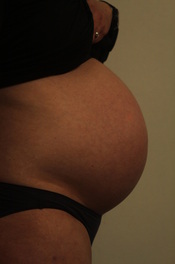 My belly in the early stages of labour. My belly in the early stages of labour. The Birth I had brought Sol home from kindergarten and just felt really exhausted. I had been working on an article that was on deadline but exhaustion washed over me and I lay down to sleep on the couch for about an hour. When I awoke at 3.45pm I continued to lie there for a few moments and then I felt a ‘pop’ of my waters breaking. In one swift movement I grabbed a towelfrom the pile of laundry beside me, threw it in the floor and rolled off the couch and on to the towel. I was impressed with myself – the towel was soaked, but not a drop anywhere else! Sol looked at me oddly, but just nodded nonchalantly when I told him my waters had broken. He’d watched numerous birth videos with me so knew what this meant. I called Leif who had just finished teaching for the day and also let my midwife Cheryl Benn know that things were underway. Sol’s birth had proceeded gradually throughout the day, so I thought I had hours to go before things really started. At this point I was having very mild contractions, spaced well apart. I was really excited but very calm, knowing everything was in place for our dream birth. I also was aware of the article I hadn't finished, so decided to get that done right away as knew that pretty soon I wouldn't have much spare time. I felt super-alert and was writing well, then all of a sudden it was like a part of my brain switched off. I decided that then was the time to email the draft to the editor and explain that was about as complete as it was going to get! 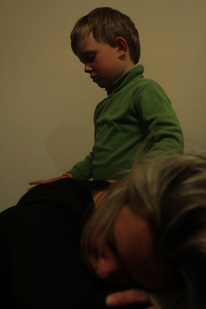 4 year old Sol helping me through contractions. 4 year old Sol helping me through contractions. Leif arrived home and started getting the room prepared. We’d instructed our baby to be born at night, and it seemed like she was going to comply. We had the fire burning and Leif hung up fairy lights and lit candles. The birthing pool was by the fire. Both grandmothers called in on their way home from work, but I had decided I wanted one last dinner together with just the three of us. After dinner I lounged over on the Swiss ball, and Sol stood beside me and rubbed my back (and occasionally climbed on me!). A really beautiful peaceful time. I realised my labour was progressing much faster than I had anticipated, so I asked Leif if he could put Sol to bed then, as I knew that pretty soon I would need all of Leif’s attention. I stayed on the swiss ball, enjoying the peace and listening to Sol’s familiar bed routine and bedtime stories. I went to kiss Sol goodnight and to make sure he knew what was happening. He had been very involved in my pregnancy and knew the drill. A few weeks earlier he had told us that he wanted to be there when the baby was being born, but he didn’t want to see her head come out. Since my waters had broken he had reminded me of this numerous times! So I was reminded of this once more, and Sol knew that when the baby was nearly being born Leif would wake him up. 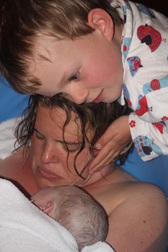 Crying with happiness! Crying with happiness! As soon as Sol was in bed it was like my body allowed my labour to progress. I continued to labour on the swiss ball while Leif started filling the pool as I felt like it wouldn’t be too long until I wanted to be weightless in the water. I usually have an active mind that is hard to quieten – I have tried meditation a number of times, but always end up sitting there with a loud chatterbox in my head. I had been concerned that that would be the case whilst birthing, however I could feel myself slipping into a really deep relaxation and became only dimly aware of what was going on in the room. Love those birthing hormones! The room was warm and cosy and lit with candles, the light of the fire and fairy lights. I recall telling Leif that it would be impossible to be stressed out in that environment! It was blissful. At about 7.30pm I got in to the pool and Mum, and my midwives Cheryl and Annie Kinloch arrived soon after. I was surprised at how fast my body was moving towards birthing and the contractions were lasting a long time and coming about every three minutes. I had a relaxation birthing CD playing and the atmosphere was just beautiful. The contractions were intense but I felt so relaxed and wonderful. I could feel our baby moving and descending and I was so overwhelmed by how perfect it was that I started crying with happiness. Notes from my midwives: 8.13pm “I can definitely feel her pushing down” 8.14pm “This is so lovely”. Rachel and Leif laughing together. 8.21pm Rachel verbalising the last contraction is beginning to give her a sense of breathing her baby out. 8.28pm Rachel moving in to a hands and knees position in birth pool. Rachel looking beautiful and feeling relaxed on endorphins. 9pm Birth pool filled deeper. Rachel semi-reclined. CD finished and Rachel enjoying the quiet. I was feeling the baby descending lower and every so often started feeling that the birth was not that far away. I continued to labour in the pool, but started feeling really exhausted. My body started feeling really heavy. My contractions had slowed a little and I decided to have Cheryl examine me. My cervix was 7cm dilated. I said that I was really tired and that I wanted to have a sleep. At about the same point in Sol’s labour I felt exactly the same way, but I was in the hospital for his birth and I recall being told that it certainly wasn’t the time for a nap! I loved my midwives when they simply responded to my request by asking where I wanted to sleep. I wanted to rest on the couch, so my lovely helpers made a bed up for me and I snuggled in, Leif sitting right beside me. It was so peaceful and quiet, and it was as if Leif and I were the only people in the house. I quickly fell into a deep relaxation, whereby I was having big beautiful dreams, then I would come back to ‘real’ for each contraction, gripping Leif’s hand tightly. Immediately following each contraction I feel back in to dreamland. It was a beautiful rest. Like being on a boat in slow-motion, the peaks and troughs of the sea movement. I stayed in this zone for about 40 minutes, and then all of a sudden was ready to continue. 10.10pm Rachel needing to get up off the couch as contractions more intense. 10.14 Back in birth pool. Rachel still feeling baby move. 10.18 “She is doing lots of kicking” 10:20 Rachel groaning through a string contraction “It’s a big opening one”. 10.51 Rachel breathing through some very pushy contractions. Rachel feeling baby moving down a bit further. I was in a deeply relaxed state, just as we had discussed with Aileen, only vaguely aware of the people in the room and just so focused on my body and it opening up to allow our daughter to be born. As I laboured in the pool I was having beautiful dreams and my body felt so powerful but so relaxed. During the classes with Aileen we had discussed the distinction between the analytical mind and the intuitive mind: with all the medical intervention in many births, we had moved so far from the intuitive mind being the dominant one in a labour. All evening my analytical mind had been switched off. Yet at this point as I drifted between dreamland and contractions, suddenly my analytical mind popped up. It was very clearly like another voice, and it is the first time I have experienced such a dichotomy within my mind. Very clearly this other voice spoke over the dreamland that I was in: “Oh my goodness Rachel, here you are, you are supposed to be having a baby, pushing a baby out, all these people are here, waiting for you to do something, and all you can do is laze about in this pool sleeping, for christs sake stop being so lazy and push this baby out!” I listened to this other voice. What the hell was I doing?! A contraction hit and suddenly my body began pushing, an all-consuming effort to PUSH this baby out. I felt my whole body contract almost involuntarily and it was a scary, out-of-control feeling. I felt the baby descend a lot and I suddenly realised I could push this baby out right there and then. I panicked, because that was certainly not what I had planned, nor what I wanted. In that split second I knew that baby could arrive right then, and it would be a painful and fast entrance and I would likely tear. I cried out to Leif to calm me down – in my memory I was screaming this in panic, but having viewed the video it wasn’t as violent as it felt. Leif did one of the relaxation exercises we had practiced and the soothing words of the midwives put me back in control and I resumed breathing and found that calm place again. 10.58 Sol woken by Leif for the birth. 11.01 Rachel supported by Leif to breathe through intense contractions. I was in a particularly deep sleep when a really intense contraction happened and I knew that our baby was nearly ready to be born. 11.07 “She is coming, I can feel her head moving down” I knew I didn’t want to rush her out and just let my body and my baby take over and let them do what they needed to do. I just kept breathing through each contraction and felt no urge to push. In my mind I could almost “see” our baby making her way out, it was such a clear vision and it really felt like she was doing it rather than me. There was no searing pain when her head emerged as I had experienced with Sol’s birth. It was such an amazing feeling as I felt more of her making her way out. I started giggling – I could feel her legs kicking inside me as they made their way down. I felt absolutely euphoric. 11.13 Rachel birthed her baby so gently in water and was caught by Leif. Leif guided baby between Rachel’s legs and Rachel lifted baby to her chest. 11.14 Baby cried. Cord loosened around neck. 11.16 Sol meeting his baby sister while being cuddled by Dad. 11.27 Baby so alert, gazing at Mum 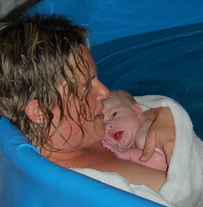 These were just amazing moments, clearly etched in my mind forever. Our little girl in my arms, surrounded by peace and love. Sol meeting his little sister for the first time. We had already decided that we would leave the cord attached as long as possible, and certainly until I had naturally birthed the placenta. 11.28 Cord still pulsating strongly 11.29 Placenta birthed 11.32 Cord clamped by Leif and cut, watched by Sol 11.40 Rachel and baby assisted out of pool. Dried and covered with warm towels. 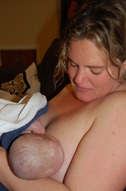 I had read about babies doing a ‘breast crawl’ immediately after birth, and wanted to give our baby that opportunity. Our little baby was placed on my chest and she immediately started snuffling round. I was mesmerised as she started inching her way to my right breast. It was so hard to resist the urge to guide her, but equally fascinating knowing she was capable of finding the nipple herself. In a very short space of time she had expertly found the nipple and started her first feast! 12.02am Baby sucking at breast after latching herself at 49 minutes old. We were all hungry so the food was brought out and we all tucked into a midnight feast round the coffee table as we chatted about the evening. A perfect, relaxing way to finish off an amazing evening. As I sat there on the couch in the comfort of my own home, with my baby suckling at my breast I was so content. Our baby slept on my chest all night and I got very little sleep, gazing at my family all snuggled in our bed together. I awoke before them all and enjoyed some moments of peace, looking at wonder at what we had created and thinking I was the luckiest person in the world. Once we had got to know her, we named our wee baby Nina Kowhai Hansen. The kowhai will always be blooming on her birthday.  This guest post is by Dannielle Miller. Dannielle is a highly respected and experienced educator, author and media commentator on issues affecting teenage girls. She is CEO of Enlighten Education and this post originally appeared on her blog. I had a revealing conversation with a single parent of a 12-year-old girl the other day. His daughter had been feeling particularly moody, he said, as she was just about to menstruate. I asked if she had had this premenstrual phase of her cycle explained to her. “Yes, she knows all about her periods” was his response. Yet I suspected after talking with him further that, as it is for many young girls who are given “the talk”, this conversation was reduced to an explanation of how to care for herself physically during her period. In its most simplistic form, it is often a chat about pads versus tampons, and tends to come with the dire warning that if they are not “careful” they could now fall pregnant. The fact is, once our girls menstruate, we don’t tend to be very helpful in advising them beyond sanitation, abstinence and, if we are particularly switched on, contraception options. Rarely do we discuss how to deal with the fact that for many girls and women emotions may be heightened during the premenstrual phase and behaviour altered. And even if we do allude to premenstrual tension (PMT), it tends to be in terms that promote and reinforce the archetypal “crazy lady” myth, which would have us reduce everything a woman expresses during this time to hysterical ramblings. It is particularly apt that women are often referred to as being “hysterical” during this stage in their cycle, as the term derives from the Greek word meaning “womb” (hence the term “hysterectomy”). Historically, society would have us believe some deep flaw within our wombs is literally making us insane! "One day she is all smiles and gladness. A stranger in the house seeing her will sing her praise . . . But the next day she is dangerous to look at or approach: She is in a wild frenzy . . . savage to all alike, friend or foe . .." Semonides, Greek philosopher (c. 556–468 BC) Premenstrual tension has been recognised as a medical condition since 1953 and has even controversially been used as a defence for murder—hence the headline to this post, which comes from a newspaper report chronicling a 1980s court case in London in which PMT was raised (unsuccessfully, I might add) as a defence for homicide. Premenstrual tension may include physical symptoms such as leg cramps, bloating and headaches; emotional changes such as increased depression and anxiety and lower self-esteem; and behavioural changes including increased irritability, social isolation and being accident prone. I have been known to suffer from particularly bad PMT at various points in my life. Leg cramps? Check. Bloating? Absolutely. Increased depression? I have been known to weep at the thought of making yet another school lunch. Irritability? My ex-husband used to always joke that I would threaten to divorce him once every month. Despite knowing my feelings at this time are certainly heightened, I also believe they are valid. In fact, as I’ve gotten older I’ve learnt to be very attentive to them, as I can often more clearly see, for example, what is wrong in my relationships at this stage. Usually I tend to repress these darker feelings. In a sense, my inner voice stops whispering and starts screaming at me (okay, okay, and often at others) that week! I am no longer so quick to silence my womb and my female intuition. Rachel Hansen, a colleague and sexual health educator, offered me her insights: "In my 20s, I used to dismiss PMT as that time of the month when I was particularly irrational, but I now think of this as a time when I actually allow myself to acknowledge and express the full range of my emotions. Talk about liberating! Menstruation has traditionally been associated with craziness and all things negative. I think that we women have to reclaim this time in our lives, to reclaim it as a particularly special, empowered time – heck, perhaps the closest we get to being Superwoman each month!" A friend who is a mum to two girls explained to me how she supports her eldest daughter to not ignore, but rather manage, her mood swings: "She would get so emotional and fiery, to the point where she was confused and didn’t know what was ‘wrong’ with her and why she kept arguing with us. I sat her down and explained that it’s very normal to feel the way she does and that her feelings are legitimate, but that in the midst of those more out-of-control moments around period time, we need a word to remind her, and us, as to why she’s struggling to articulate herself. I told her to choose a word that reminds her of something calm and happy that she could use, so that she can just say the word, and then that will be our signal to just stop and hug her, to show her that we care about her feelings, but that we need to pick up the conversation later. (Most of the time, what worried her so much is forgotten later anyway.) Her word is ‘unicorns’. This works really well for us and for her, and has made a huge difference." Psychologist Jacqui Manning offered me the following really practical tips for girls (and women) to help them better understand and manage this stage:
Of course, it’s also important to distinguish the feelings that really are worth listening to during this period (pardon the pun) from those that are okay to merely let wash over us. A good friend offered me this when I asked for her thoughts on PMT last week: "Danni, it’s all a bit too close to home for me today given that I’ve spent the morning in bed feeling bloated and crying for no clear reason at all. Based on the thought processes I was having, it has something to do with a letter that was sent about me in high school, a sad movie I once saw, and the fact that my boyfriend doesn’t have time to go out to lunch today. The TRIFECTA!" Certainly our womb-words can seem somewhat confused and irrelevant, but they can also be deeply insightful. I’m choosing to embrace the journey and help my daughters embrace it too. As soon as we found out that I was pregnant we told our three-year-old son Sol about the pregnancy and he has been involved in the midwife appointments and lots of excited talk about our new baby. He recently accompanied us to the 20-week ultrasound scan. After the radiographer had done all the important measurements and observations, she got to the least important part – finding the vulva or the penis. While she was looking for that part of our baby’s body she said to me: “Ouhhh, you’ll soon know if you’ll have to be buying a pink tutu!” (I am sure my husband smothered a laugh at this point. I refrained from launching into a tirade about gender stereotyping and the findings of various neurological studies on babies and gender.) As it turns out, we spotted a vulva. And I realised that, at 20 weeks gestation this wee girl had already experienced her first gender stereotyping. It isn’t that pink tutus violently offend me, it’s that there was an assumption that if my baby had a vulva, then a pink tutu would be the most important thing on my mind, and that her vulva would automatically predispose her to an uncontrollable urge to wear pink tutus. Who knows, she could be an absolute ballet fanatic, in which case I am sure our house will be loaded with tutus of all description. Or she could be a soccer player, a hip-hop dancer, a chess-genius, a swimmer... - in which case we may have no pink tutus at all. Or maybe she’ll have stages of being all of the above, and our already-cluttered house will have a collection of all sorts of outfits in all sorts of colours. All I know is that I will do everything in my Mama-Bear power to protect her from the tirade of gender-limiting stereotypes that I know will attempt to surround her from birth (and before!). All of a sudden I am deeply grateful on a personal level for the amazing work done to counter such attitude by individuals and organisations such as Enlighten Education, Pigtail Pals, Pink Stinks and 7Wonderlicious. And I will leave you with the wisdom of little Riley, who articulates the craziness of all this stuff just so so well: A couple of months ago Universal Royalty announced that they were heading to Australia. That's right, the company of 'Toddlers and Tiaras' fame decided that Australia needed to glitz up their kids, and they were the people to help! But there was a strong voice of opposition in Australia, and many voiced outrage at the proposal. Catherine Manning founded Pull The Pin and rallies were held all around Australia to draw attention to the pageants and the the harm they cause. The Royal Australian and New Zealand College of Psychiatrists have backed calls for child beauty pageants to be banned, saying they encourage the sexualisation of children and can cause developmental harm. The chair of the college stated "We're giving these kids messages that how they appear, how they perform and standards about what they're to come up to is actually more important than what they're like inside." Catherine is an Enlighten Education colleague of mine, and last week when Universal Royalty announced they were also New Zealand-bound, Catherine asked me to coordinate the Pull The Pin campaign in New Zealand. I felt honoured to be asked, and set up the Pull The Pin NZ facebook page. We are campaigning to end all child beauty pageants in New Zealand. It is our view that pitting young girls against each other in a competition based on physical beauty is potentially harmful to their development, and can lead to lowered self esteem and other conditions including eating disorders and depression. We are also concerned with the adultification and sometimes sexualisation of pageant entrants, and their engagement in adult cosmetic treatments such as waxing and spray tanning. We are calling on the government to legislate to stop parents and pageant organisers from exploiting children by enforcing age restrictions on beauty pageants and adult cosmetic procedures (unless for medical reasons). We will be co-ordinating public rallies once we have more information on when and where these pageants will be held. It's been fantastic receiving so much support on this issue - it is definitely a topic that many New Zealanders feel strongly about! New Zealand media coverage over the last couple of days:
And if you needed any more convincing that these pageants are NOT something we want to become a part of kiwi culture, check out this video featuring Universal Royalty's Eden Wood: A few days ago I wrote a post about a radio station who were running a "Win a Wife" campaign. Along with many others, I thought this was appalling. We decided to gather together like-minded people in a Facebook page to share ideas and information about why this competition was not OK, and strategies to stop the competition. In six days we gathered the support of over 1200 people!
This campaign has been a huge learning experience for me on a number of different levels. Learning Experience #1 I have been saddened and horrified and depressed and angry at the abuse and pornographic images hurled at us. A few of the less-explicit examples can be found here. I learnt that there are a lot of people with lots of destructive anger out there. This vitriole is reason enough for us all to question what sort of sentiments this particular radio station is encouraging. *Update: If it's all getting a bit much, the best remedy is laughter. Do check out this post with a choice selection of some of The Rock's supporter arguments. Learning Experience #2 More importantly, I learnt that there are so many wonderful people out there who are so passionate about creating a just and equal society, and are willing to take action to make this happen. And I just loved connecting with them all. People sharing their knowledge and supporting each other. The Facebook page we created was just a vehicle that brought such people together. It was amazing to realise that a small action (creating the page) snowballed in to something so much bigger than we ever thought it would. AND WE MADE A DIFFERENCE!
Learning Experience #3 It was a beautiful summer evening this evening. My family was here for dinner and my little boy was being particularly gorgeous. (I know, I know, I am biased, but that's him this evening in the photo below - don't you think?). But I was so angry at the world, having spent the afternoon dealing with abusive people and deleting explicit photos off the Facebook page, that I couldn't enjoy the evening. I was grumpy and preoccupied. So I turned off my computer and went on a lovely walk with my wonderful sister. I raged about it all, and then I realised, over the past six days this campaign had consumed me. I had not been fully present with my little boy or husband, my garden is overflowing with needed-to-be-picked-yesterday produce and I have neglected my writing and positive work with teens and parents. I learned that neglecting these things I love makes me miserable. So I decided to step down from moderating the Facebook page. (Of course I remain an passionate supporter). And I will not publish comments from others on this blog attacking my stance on the 'Win a Wife' competition. I have had every 'argument' (and more!) thrown at me about this issue and remain strong in my conviction. I have a HUGE amount of respect, gratitude and admiration for people who are continually standing up for injustice and inequality (Catherine Manning, Melinda Tankard Reist, Sue Bradford... the list could go on). I am not sure I could ever do what you do - I would certainly need thicker skin! And for all those wonderful people who are writing the letters and emails and generally spreading the word that it's not OK to treat anyone as second class citizens - you guys are awesome. A New Zealand radio station, 'The Rock' is currently running a competition to win a Ukranian wife. Yes indeed, a competition to win another human being. I am appalled. People in favour of the 'Win a Wife' competition have said "oh lighten up it's just a joke". Would a competition to 'win a real African slave' be OK? Treating other humans as commodities is not a joke. Buying humans as part of a monetary transaction is never OK. Others have pointed out that wife-buying is actually a social service - you know, 'rescuing' these poor women from their situations. Kind of like buying child pornography helps feed and clothe the child 'models'? If you really want to help Ukranian women, get in touch with the many international aid organisations and find out how to do this. The other dismaying effect this competition has had is to legitimise the dehumanising of women. A quick look through The Rock's commentary on this competition, and the entrant's 'profiles' is profoundly depressing. Furthermore, the Ukranian 'jokes' stemming from this competition are extremely offensive to the Ukranian community. I have been vocal in my opposition to this campaign, and have helped set up the Facebook campaign Stop The Rock's 'Win a Wife' campaign. This has been live for only a matter of hours and the response has been incredible. If you also think the 'Win a Wife' competition is a world of wrong, please join us on the Facebook page. We are encouraging people to write to the radio station's advertisers to voice their dismay. A number of people have written excellent posts on this topic and I encourage you to read them:
**Update 16/2/11: I want to clarify when I stand on this competition, as it seems some people are wildly generalising. I have not made any comment with regards to online dating, human trafficking, analogies with prostitution or about the situation faced by women in Ukraine. This is because I don't know enough about any of these topics to comment. Many people do know much more than me, and it's been interesting reading their commentary on various blogs and forums. I still haven't come to any conclusions myself on these, so I'll just keep learning. I DO know where I stand on this issue though: women are not commodities to be won, and this competition is legitimising the degradation of women in New Zealand, that old notion of women as second-class citizens. We're better than this New Zealand. The following is a letter to the NZ Broadcasting Standards Authority from the Embassy of Ukraine in Australia. (They don't have an embassy in NZ, so the Australian embassy acts on their behalf).
 'I think [Liz Hurley] will be thrilled by the endorsement' Dear John Key, My team and I at Enlighten Education support girls to understand that it's NOT all about who is hot and who is not, that it's NOT all about who is the sexiest and who is not. But John, your comments recently tell us that it IS all about being hot. Did you really need to publicly mull over which women would make it on to your hot 'wish list'? You have succumbed to the media's preoccupation with women as body parts, women as sex objects whose bodies are there to please males. How about a media conversation focussing on the top female scientists, the top female educators, the top female writers, the top female business leaders? I would never lambast men for having a private 'hot' discussion. But John, as the prime minister, what you say and how you act publicly has greater repercussions. I understand that you are trying to appeal to the 'average kiwi bloke', but in doing so you have lowered yourself to the lowest common denominator. You are providing fantastic fodder for the media, further objectifying women. I look forward to further 'high achiever' lists, this time not based on 'hotness' please. I will start it off - congratulations to 17 year old Jamie Fenton who has just been awarded Young New Zealander of The Year for her all-round abilities as a youth role model, academic achiever and inventor. Amazing girl, fantastic achievements! Kind regards, Rachel Hansen *Postscript: The fact that John Key's original conversation took place live on air with a man who hopitalised his partner in a domestic violence incident (fracturing her back) makes this talk about women all the more inappropriate. 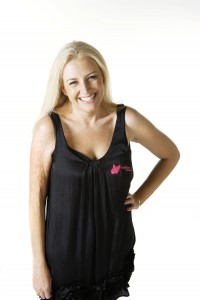 Danni Miller Today's guest post is written by Dannielle Miller. Dannielle is a highly respected and experienced educator, author and media commentator on issues affecting teenage girls. She is CEO of Enlighten Education, an organisation that works with thousands of teenage girls across Australia and New Zealand each year. Dannielle writes a thought-provoking weekly blog, and hosts a Facebook page, where an active community of students, parents and teachers and provide an important forum for discussing issues relating to girls and education. Dannielle is also the author of The Butterfly Effect, a book on raising happy, confident teenage girls by forging deeply connected and loving mother-daughter relationships. I lament the use of terms such as “liberation” and “empowerment” to sell women more and more product. In this post I want to particularly question the use of terms implying female empowerment in the growing trend to convince women to change what is surely something quintessentially female — our vaginas. Case in point? The latest series of advertisements for Schick Quattro’s TrimStyle all-in-one razor and bikini trimmer. The ads invite you to “celebrate your inner confidence” and, using the language of liberation, “free your skin”. According to the company’s PR blurb, five everyday Australian women were photographed and filmed for the campaign wearing nothing but lingerie, in and around some very public locations in Sydney’s CBD. Men are shown gawking at them, whilst other women look on admiringly. The women do have inspiring stories — there is a single mother and a cancer survivor — yet surely as the advertisement is for a bikini razor and they are seen posed in lingerie, we can only assume that their confidence actually comes from having well-groomed vaginas. Speaking of well-groomed vaginas reminds me of one of the most flabbergasting moments in talk-show history. In January last year Jennifer Love Hewitt famously discussed on American TV that she had devoted an entire chapter of her new book on relationships to decorating her hairless vagina with jewelled decals — a practice known as “vajazzling” that is gaining in popularity here, too. Hewitt told her host “Women should vajazzle their vajayjays . . . It really helped me.” She went on to say, “After a breakup, a friend of mine Swarovski-crystalled my precious lady . . . and it shined like a disco ball.” It really “empowered” her, she insisted (although apparently she was not quite empowered enough to use adult terms for her anatomy). Forget the war on terrorism — if the amount of ads for decorating, shaving, waxing and electrolysis are anything to go by, it is the age of the war on women’s vaginas. Actually, it is not just grown women who are being told they should doubt their own genitals. During the formal season last year, beauticians noted a huge increase in the number of young women wanting “intimate” grooming treatments. Girls as young as 14 were asking for Brazilian waxes. Enlighten Education’s Program Manager for New Zealand, Rachel Hansen, who is also a women’s health and sexuality educator, tells me of a school in NZ for Year 1 to 13 students that ran a beauty salon’s ad for Brazilian waxing in the school diary. Imagine pulling out your five-year-old daughter’s homework diary and an ad for Brazilian waxing jumping out at you. It seems teens no longer even know what “normal” is. In episode one of the UK’s 2009 Sex Education Show, when teens of both sexes were shown images of women with pubic hair, they gasped in what seemed to be shock or disgust. The producers had set out to show that in reality “we all come in all different shapes and sizes. From penises to pubes, bums to boobs whatever you’ve got it’s all perfectly normal.” Cosmetic surgeons would have us believe otherwise. As if waxing, plucking, electrolysis and decorating is not enough, far more serious procedures are being widely promoted by surgeons as important for restoring women’s “confidence”. Researcher Karen Roberts McNamara argues that women are going under the scalpel to have their vaginal openings tightened and their labias made smaller because they have been convinced this will “normalise” them and thus give them confidence: The sanitized ideal of the clean, delicate, discreet vaginal slit, so widely used in the plastic surgery industry discourse, functions in such a way as to cast the bodies who have not undergone these procedures as necessarily dirty and unsightly . . . Scholars have noted that in years past, women rarely had the opportunity to see other women’s vaginas and thus had no sense of how a typical vagina might look. Yet with the mainstreaming of the adult entertainment industry, the situation has changed dramatically. Now, a beauty standard has emerged, one established primarily through porn actresses, nude models and strippers . . . The irony of this situation is that in pornographic films and photographs, everything from eye colour or stretch marks, to genitalia, can be modified digitally. Amanda Hess, in her excellent piece “The Problem With Defending The Sacred Choice To Vajazzle”, concludes with a call-to-arms of sorts that I am taking up, and that I urge all girls and women to take up. For now, the more extreme performances of femininity, like breast implantation, vaginal ‘rejuvenation,’ and Vajazzling aren’t considered the norm for women. I’m not going to be met with shock when I remove my pants and reveal to my sex partner that I haven’t converted my pubic mound into a shiny disco ball. But these days, it wouldn’t be out of the ordinary for him to be shocked that I’m not perfectly waxed. The body hair ship may have sailed, but vaginal modification is at a point right now where we are still in a position to fend off the tide. And my greatest fear is that someday, we will wake to find that our girls are being routinely Vajazzled upon puberty, and realize that we never stood up to say, ‘This…is . . . ridiculous.’  I am saddened by the way menstruation is usually referred to in negative ways. Girls usually laugh uncomfotably when I suggest to them that actually their menstrual period is AMAZING and a cause for celebration. And, encouragingly, more often than not they are open to learning to see it in a positive way. In my workshops with adults, women are often keen to share their experiences of their period. I am really interested in DeAnna L'Am's idea of menstruation being a 'chain of pain' that is passed from generation to generation. Today's post is written by DeAnna L’am. DeAnna is a speaker, coach, trainer and author of 'Becoming Peers – Mentoring Girls Into Womanhood'. Her pioneering work has been transforming women’s & girls' lives around the world, for over 20 years. DeAnna specializes in enriching women's lives at any age, helps mothers develop ease & confidence about their girl's puberty, and trains women to hold RED TENTS in their communities. Do you truly believe nature intended women to suffer monthly? This is a rather absurd idea, when you think of it this way, since menstruation is an essential component of women's ability to birth life. Without it, women will not be able to conceive. So how did this happen? How did a natural process become such a problem? Let's look at how menstruation is held by the culture at large. In western cultures women seem to be doomed when they do, and doomed when they don't (bleed, that is). Women are considered to be out of control when they are “on the rag,” and out of control when they are in menopause. Imagine how out of control one might get when their body is tired, their mind fatigued, their emotions exhausted... when every ounce of their being wants to go to sleep, yet they are not allowed to do so.... not only are they denied sleep, they are expected to go to work, be productive, cordial, efficient, and social.... wouldn't you go berserk? Well, women often do, if we buy into the cultural expectation of having “every day of the month be the same”, and push ourselves to prevent menstruation from interfering with our work and life. On top of this, we are also fed a diet of negativity about our menstrual cycle, from a very young age. A cultural taboo, often not mentioned by name, menstruation is referred to as a “necessary evil,” a nuisance, or “the curse”. Now imagine again how you would feel if you were so tired that all you could think of is sleep, yet you were told that your state is “a curse” and you must get over it and get on with your work. Or if you were offered medication to overcome your tiredness, and expected to perform at top notch? Wouldn't you snap? Indeed, this is what happens to many women all over the world, in response to years of internalized negativity about menstruation. This is coupled with the unacknowledged, ignored (and often unconscious) deep yearning to go inward, rest, replenish, and renew, during menstruation. Add cultural hostility to our denied monthly need to regenerate, and what do you get? Out-of-control-raving-mad-lunatic-raging-bitch! And rightly so! Since this is the ONLY way we can express the tension inside us. Or, perhaps, the only culturally acceptable way - to which society reacts by perpetuating the belief in menstrual “badness.” Not being taught to honour our monthly need for regenerating our emotions, and renewing our spirit (while our body renews itself) we not only loath our menstruation, but start developing symptoms, which will make us slow down, stay in bed, rest... This whole chain reaction could have been prevented in the first place, had we slowed down and took time out, monthly, without our body having to scream at us via painful symptoms. This “chain of pain” is passed on collectively by our culture, and individually -- from mother to daughter. Your grandmother was probably handed negative messages from your great-grandmother, your mother from your grandmother, you from your mother, and now, is your daughter receiving this painful legacy from you? How about your granddaughter, stepdaughter, niece, or your best friend's daughter? Do these girls hear you talk about menstruation as something you dread, hate, or can do without? Do they experience the wrath of your mood swings, irritability, or depression when you are menstruating, because you don't take time for yourself? What message do you think this conveys to them? And if you could convey another message, wouldn't you? Yes, you may say, but I can't convey another message since I'm suffering from PMS symptoms... Here is where I'd like to rock your boat a little (or a lot) by saying: PMS is Not a Requirement! PMS is your (wise!) body's strategy for getting your attention! It is your body's way of telling you that you need to slow down, go inward, release any toxins from the month you've lived, and regenerate yourself for the month ahead. Taking medication for PMS is like taking pills to suppress yawning when you are tired, while all you need to do is go to sleep. When you start questioning the beliefs you internalized about menstruation, when you start caring for your body and allowing it to naturally renew (rather than suppressing its need to rest) you are going to be able to gradually reclaim your cycle as a source of renewal in your life. Not only would you reverse your symptoms, but you could stop the legacy, which our culture has been blindly passing down from one generation to another. Furthermore, you'd be able to model an empowered womanhood to the next generation, starting with your own daughter. She and her peers will, in turn, be able to pass it on to those yet to be born. PMS can stop with you! And together, we can change the world... Thanks to DeAnna L’am for this thought-provoking post. It’s been a fascinating few days since I was alerted to the breasts marketing campaign and wrote my original blog post. This was picked up by the media and I appeared on current affairs show Close Up on Friday evening, debating NZgirl’s founder Jenene Freer.
As my first TV experience, I would say it was definitely trial by fire! It was certainly set up as a heated debate, rather than an ‘interview’ per se, and the fact that it was live to air made it a pretty intense experience. People have vehemently criticised both of us for interrupting each other, but I feel the producers had intended it to be this way so have stuck up for Jenene here. Jenene and I shook hands afterwards and she was very gracious. She said to me afterwards that on many things we were probably on the same page. I agreed with her, and certainly regarding breast cancer, we both would love for no woman to suffer this dreadful disease. What we disagree on is the level of harm caused that is an acceptable level in order to raise ‘awareness’ or money. Who has this campaign harmed? • The women and their families who uploaded naked breast photos that now feature on countless explicit porn sites. These women have no control over this image, or what has happened to it. • The many women and girls for whom a happy, healthy body image and strong self esteem is a challenge. The site clearly shows whose breasts are the most popular, and these are the breasts that conform to that narrow version of beauty pedalled by the media. • The many breast cancer survivors for whom “a lovely pair” campaign is just a blatant reminder of what they have not got. I have been overwhelmed by the poignant messages from many of these women. Kate has written a very touching post on this. I know that many people support NZgirl's campaign, and I know that many women have felt empowered and positive about it. That is good for them and I am not speaking for those women. I am speaking out for the many people who have been humiliated, exploited, degraded and offended by this campaign. Jenene Freer is a smart woman, she has achieved huge things in the business world and I really respect her for what she has achieved. Among other things, she is a director of an internet advertising company – she knows how to get websites making money. And no one can deny this marketing campaign has been a resounding success. Freer will be well aware of the HUGE impact this will have had on her advertising revenue – it will more than cover their maximum $5000 donation. And going forward, she can use these viewing stats to further convince advertisers to join them. Freer yesterday stated that "And just in case anyone wonders, and to clear up the "marketing ploy", I will never enter this into any marketing awards." So, companies only run marketing campaigns to win awards? Funny that, I understood that marketing campaigns were about increasing revenue. NZgirl are making way too much money out of this campaign, I can see that it would be financial madness for them to take it down. So I am not holding out hope for that. But I am relieved that they have responded to some of the criticisms and added a lot more information to their site with regards to breast cancer awareness, moderating images and about the implications of sharing information on the internet. It’s still too little, too late. It’s been quite a journey over the past few days and tomorrow morning I need to get back focussed on my work projects and my family. For those of you that sent abusive whacko messages, you have provided great entertainment. For those of you that have argued fairly against me, I respect you for making a stand for what you believe in. And for all you wonderful fantabulous people from all round the world who sent me countless messages of support and encouragement, you rock my world. The passion and outrage has been so powerful and I am proud to have been a part of the voice. Onwards and upwards! ** 8 Dec Update: NZGirl have been forced to clarify one of the un-truths stated in the Close Up interview. They put this on their Facebook wall yesterday: "The New Zealand Breast Cancer Foundation have requested we clarify any reader confusion and state that the ‘lovely pair’ campaign is in no way supported or endorsed by The New Zealand Breast Cancer Foundation." Close Up followed up with this article. Freer has continued to deny it, as evidenced in her comment below. I provided the exact transcript and find it sad that she wants to continue the lie. This video gives such a powerful message in such a simple way. Reading the Sunday newspaper over a coffee is an indulgence I absolutely love. Not being an avid sports fan, I usually give the sports section a miss. But last Sunday I picked up the Sunday Star Times sports section, because one of the issues I discuss with girls through my work with Enlighten Education is how the media portray women in sport. I had read research on the media’s treatment of women’s sport but I was optimistic that surely the situation couldn’t be quite that bad. So I opened the 16-page sports section and started flicking through. Men’s rugby, men’s soccer, men’s rugby, men racing cars, men’s rugby, boys’ soccer, men’s rugby. “Where are the women?! ” I spluttered loudly, spilling my coffee in indignation. Finally – page 14, women got a full-page devoted to them. Yes, a full page feature article on the US Open Women’s Tennis. But don’t start celebrating - the headline? And beneath the atrocious headline? Photos of five of the top women in the US Open, followed by a one-word description - go on; I invite you read this out loud using your best Grammy awards nominee voice:
I soon realised that Ivanovic was not awarded the Contestant title for her tennis prowess – oh no: “Who’s the prettiest?” she says, buttering a roll, her slim wrist holding up a Rolex watch the size of a child’s fist. “Who’s the most popular, the most fashionable, who’s getting the most coverage?” She smiles sorrowfully to acknowledge that, when it comes to these contests, she tends to do quite well.” Ivanovic wins the ‘Contestant’ award because she is winning the beauty and popularity contests. The Bitchiness award seems to have stemmed from Elena Baltacha's comment: “I wouldn’t go out of my way to start a fight, but if I feel someone has done or said something on purpose, then I will react. I wouldn’t just take it, I would defend myself.” One comment seems justification enough to generalise a whole derogatory personality trait. After being described as a “truculent teen”, Jelena Jankovic is awarded the ‘Entertainer’ trophy after stating: “We are entertainers, as well, on court, in our own sporty way... We entertain the fans, they pay money to watch us play. It’s nice to see girls who are feminine, who dress nice. Maybe in the past there were only a couple of players like that, but now players pay more attention to it. I was one of those painting my nails different colours and matching them to my dress. If you are in a nice dress you can play better, feel better. More comfortable and confident”. This statement sounds as though it comes straight off a Sporty Bratz doll packaging. Nicest: Despite being the number one seed for this event, Caroline Wozniacki gets only the briefest of mentions: “Denmark’s Caroline Wozniacki... is one of the nicest in the top 10”. Because really, what interest would there be in a ‘nice’ tennis player when there are beauties and bitches to discuss? None whatsoever it seems. Soviet Tank: And Russian Svetlana Kuznetsova obviously doesn’t live up to the sexiness-factor necessary for women to play in the US Open, taking out the ‘Soviet Tank’ award. To further my dismay, this derogatory and juvenile article was written by a woman. Numerous quotes are scattered throughout this Sunday Star Times article that portray the women as simpering bimbo fashionista bitches. Strangely enough, despite not once mentioning anything about any talent any of the tennis players have, the journalist at times seems to be trying to take a feminist perspective regarding the discrimination that abounds in the women’s tennis circuit. Although she clarifies that the issue is definitely “not the most pressing in feminism today.” In her poem ‘Sisterhood’, Kate Wilson makes the point that it is often women who are propagating the sexualisation and objectification of women. The journalist’s claim that most of the world’s top female tennis players consider their on-court fashion their primary source of "empowerment" is a ridiculous statement. What research is she basing this on? Whether it’s “brilliant exploitation of a sexist media” or “a complete sellout” this journalist is part of it. 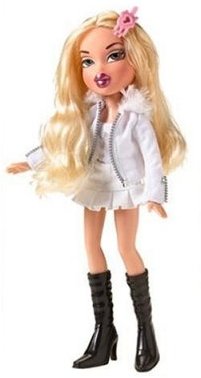 'Cloe' The article portrays the world’s top tennis players as if they were Bratz dolls, characters in an imaginary world of bling and beauty, the tennis a mere hobby on the side. In fact, I checked in on the Bratz website this morning, and realised that The Sunday Star Times article was just a grown-up version of Bratz Chatz. Let me share with you this morning’s inspiring Bratz Chatz: (Note to the uninitiated: Bratz dolls are marketed at girls age 2 – 11. There are five scantily clad, heavily made-up Bratz dolls, each with their own ‘personality’ and “passion for fashion”. This is the chat that occurred between the doll characters this morning) Sasha: Dancing is sooo much easier for me than sports. I love watching Cloe play [tennis] but it is so hard for me in gym. I have to sing to get through it! Jade: Yeah, I would much rather watch sports than play them but I get plenty of exercise walking around the mall every weekend, lol! Yasmin: Cloe convinced me to play tennis with her and I totally fell in front of Cloe’s very cute coach. I don’t know how she focuses on the game! Cloe: See? Good things come to those who work out! Btw, Yas was much better at tennis than she lets on. She’s got a mega strong serve. Sasha: Enough about the game! Who’s this new coach?? I think it’s time to set up a group hang for Cloe’s next match so we can scope out the guy! Cloe: Everybody chill! My tennis coach is awesome, he’s on the team at school, and we are JUST FRIENDS!! But I wouldn’t mind a cute outfit to wear, tee hee. Jade: Totally! And I’ll make her a new outfit because the last time I watched her play she was in ratty old sweats. So NOT cute! Yasmin: Ooh, I smell a makeover in the air! Not that our pal needs a makeover, since she’s cute enough on her own. Just a cool new look. So our young girls play make believe with sexy fashionista bimbos, and the media continues the conversation for our real life tennis heroes. Thank you Sunday Star Times, you made my search for discriminatory reporting of sport far too easy and time-efficient. I am horrified that it is 2010 and demeaning and offensive drivel like this is the only mention of sportswomen in New Zealand’s biggest newspaper of the week. I am heartened only by the fact that it was not a New Zealand journalist. Yet why the need to import this from the UK? I hope you will join me in emailing your dismay to the Sunday Star Times editor - [email protected]. (Note: I was unable to access a free version of this article that was written online, but it appears to be an edited version of an article that appeared in the Guardian UK on 19/06/10.) And while you are here check out this fantastic poem that covers a number of points raised in this post, and gives a call to action to all women: 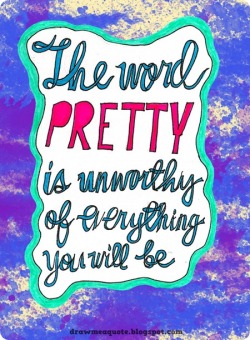 This is an extraordinarily powerful poetry performance by Katie Makkai defining the word "pretty", and the pressures faced by girls and women to define themselves by a narrow definition of "pretty". I love that it is calling for change and that it is raising awareness of the messages that mothers (and women in general) are passing on to their daughters. And the call to action at the end, a vow to her own 'someday- daughter' gave me goosebumps and tears. I invite you to watch the video below. Thanks to Dannielle Miller for pointing me to this video. A powerful statement on the media's portrayal of women. It sent chills down my spine and tears to my eyes. |
AuthorRachel is a writer and educator whose fields of interest include sexuality education, gender, feminism and youth development. Archives
November 2023
Categories
All
|

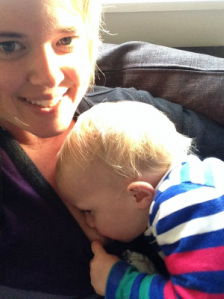
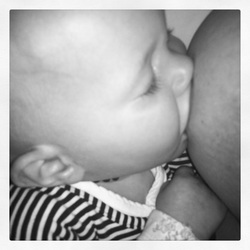
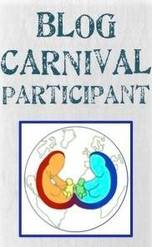

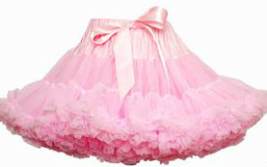
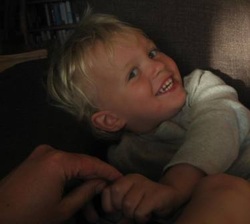

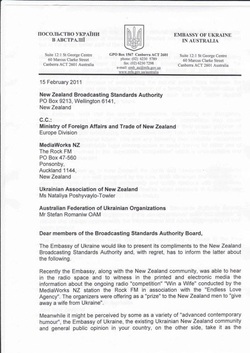
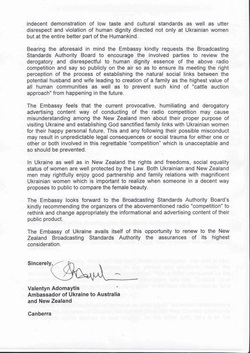
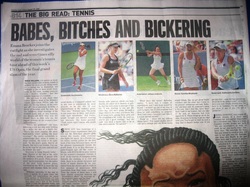
 RSS Feed
RSS Feed




